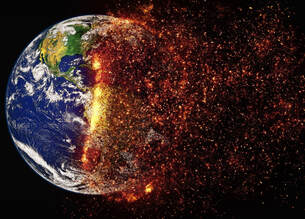 The topic of our February 1 meeting was Climate Change. We were honored to have the author of Brighter Climate Futures (2020), Dr. Hari Lamba, join us for our discussion. His book is highly recommended, as it gets into the details of how we can address this urgent problem. The essential theme of Dr. Lamba’s book is to provide a plan for how we can combat all aspects of climate change. 1) Causes of Global Warming Greenhouse gases concentrate in the atmosphere and trap heat from the sun. There are three primary types of greenhouse gases: carbon dioxide, methane, and nitrous oxide. Burning of fossil fuels (coal, oil, natural gas) and wood are the primary source of human-caused carbon dioxide emissions. We pump 55 billion tons of carbon dioxide and other greenhouse gases into the atmosphere every year. Human-caused sources create the majority of methane emissions, accounting for about 64%. Some of the sources are cement production, cows raised for dairy and meat. Food trash that is not composted also is a source. Sources of nitrous oxide are primarily the application of fertilizers in agriculture. Nitrous oxide has 300 times the global warming potential of carbon dioxide.  2) The Effects of Climate Change The planet is becoming hotter and less livable. Land areas are getting warmer, which will result in extreme heat. The oceans also are getting warmer which causes more water to evaporate into the atmosphere, resulting in more intense storms. Massive storms that used to be considered 100 year events now are happening on a regular basis. The Intergovernmental Panel on Climate Change tells us that if the global temperature climbs more than 1.5 degrees Celsius we are on the verge of our planet becoming uninhabitable. 3) Ways to Mitigate the Problem Solar energy is the most viable solution because it can be produced locally and cheaply and is non-polluting. Nuclear power is extremely expensive and results in dangerous waste. Geothermal energy sources can be viable for areas that are close to them. Hydrogen fuels cells already are being used for public transportation in many areas. Forests can be designed with fire breaks to prevent the spread of wildfires. As we move from fossil fuels, we need to include job training in these new industries for those who are threatened to lose their jobs. Because the US is only 5% of the world’s population, it is essential to support the rest of the world, especially developing nations, to get on board with converting to sustainable energy. Carbon sinks are natural areas that absorb carbon dioxide such as forests and coastal marshes. However many of these sinks have been affected by deforestation and other land use changes. Massive fires due to our warming atmosphere are destroying large areas and contributing more carbon into the atmosphere in areas such as California, Colorado, Australia, Siberia, Greece and Brazil. Such deforestation results in destructive mudslides when heavy rains come, further destabilizing natural areas that used to absorb carbon. What we can do as individuals:
For more information go to Dr. Lamba’s website www.brighterclimatefutures.com, or to 350.org. Climate change image by Pete Linforth via Pixabay Your comments and thoughts always are welcome. Also, don’t forget to look at our blog site renewingdemocracy.org Please recommend this newsletter to people who you think might appreciate it. If you want to be added to the list to receive each new newsletter when posted, fill out our contact form and check the box just above the SUBMIT button. You may also use that form to be removed from our list.
Visit our Books page for information about purchasing The Future of Democracy, The Death of Democracy, and Truth & Democracy. Click ↓ (#) Comments below to view comments/questions or add yours. Click Reply below to respond to an existing comment.
0 Comments
Your comment will be posted after it is approved.
Leave a Reply. |
 5th edition now available 5th edition now available
Steve ZolnoSteve Zolno is the author of the book The Future of Democracy and several related titles. He graduated from Shimer College with a Bachelor’s Degree in Social Sciences and holds a Master’s in Educational Psychology from Sonoma State University. He is a Management and Educational Consultant in the San Francisco Bay Area and has been conducting seminars on democracy since 2006. Archives
July 2024
Categories |
 RSS Feed
RSS Feed